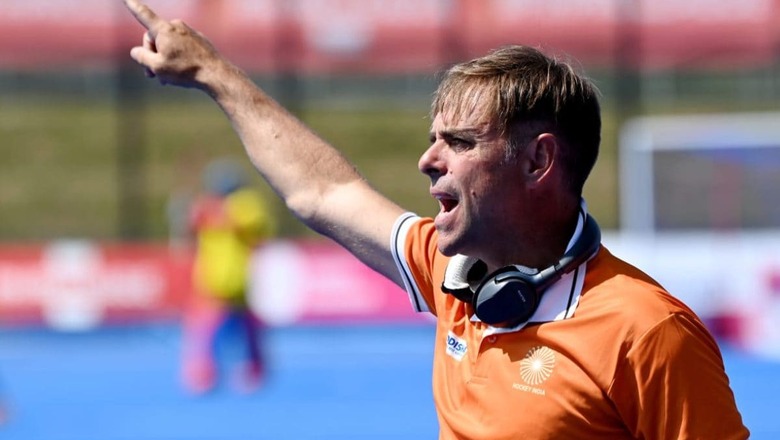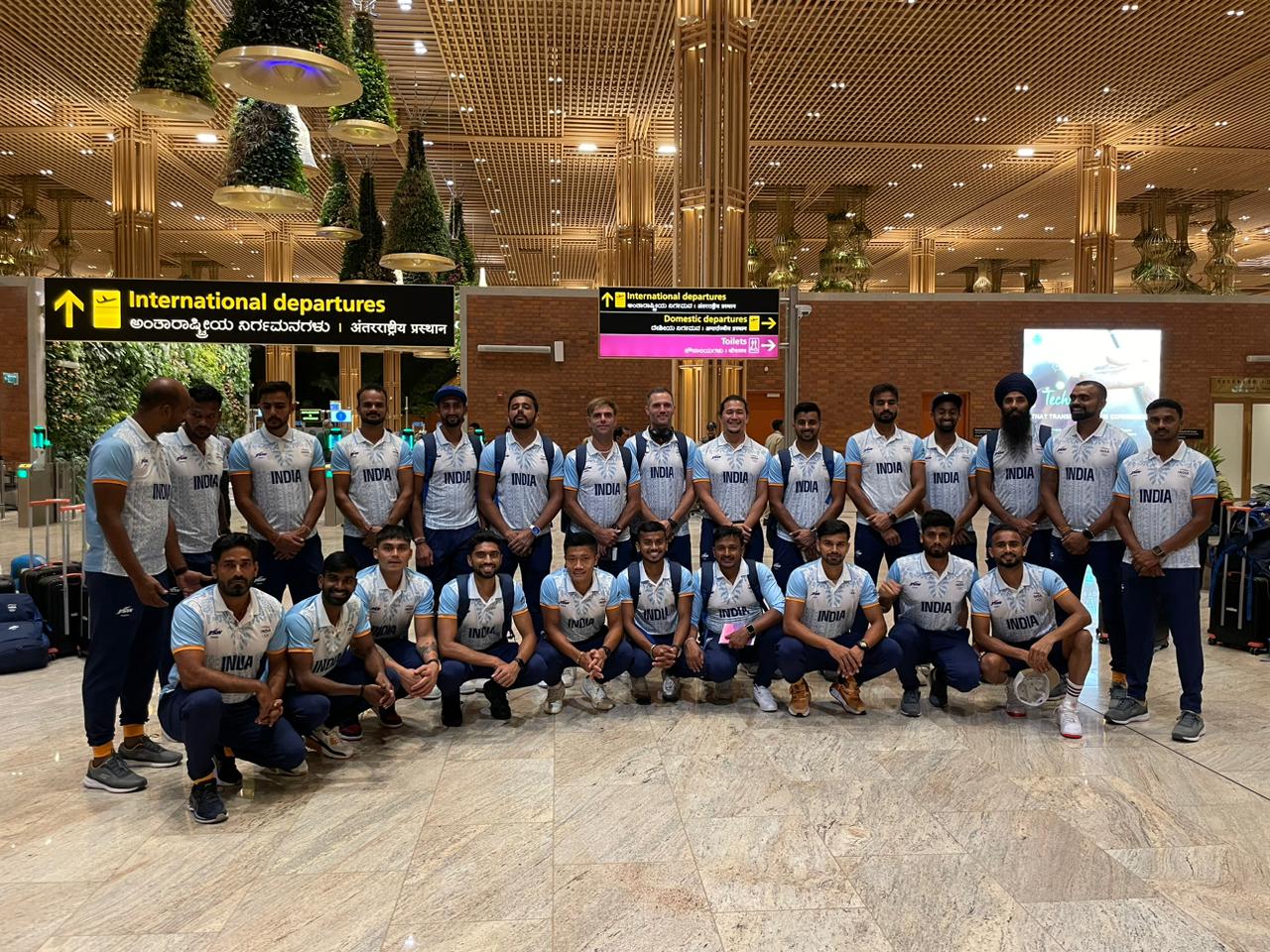
views
For the entirety of his playing and coaching career, South African Craig Fulton has found himself at the opposite half of the field of play against India. It’s been nearly 20 years since Fulton, a former South Africa international, took to coaching during which graduated from coaching clubs to playing a vital role in Belgium winning world cup a historic Olympic gold.
Today, he finds himself in India’s half and in perhaps one of the most coveted but challenging role of their head coach. It’s a role that demands nothing less than tournament triumphs. One wrong step and the head falls. Fulton is aware of the task at hands and after a mixed start to his reign that began this year in April when Graham Reid stepped down following the Hockey World Cup debacle, Fulton has raised expectations the team is headed in the right direction.
Also Read: Asian Games 2023: Medal Tally, Schedule, Results, Date, Venues & More
At the 2023 Asian Men’s Hockey Champions Trophy in August, India were in stunning form. They pumped 29 goals and conceded just 8 through their title win right ahead of the much bigger and stiffer challenge: Asian Games. It’s harsh to judge someone by one failure and vice versa but the hopes have been sparked that the team is ready to shine at bigger stages.
Ahead of the team’s departure to China for the Asiad, News18 Sports caught up with Fulton for a conversation facilitated by Hockey India during which he spoke on his coaching philosophy, dealing with the pressure of the job, his man management skills and more.
Excerpts
Whenever a new coach is appointed, there are quite a lot of expectations. So how has been your experience dealing with the expectations from you and the team considering your vast experience as a coach and the success you have had in the role so far?
I think any coach that takes over a high performing team in a high performance program, in a full-time program that’s won a history of Olympic medals and success in all different forms of the game, there’s always going to be expectations. It’s natural because the fans want it, the stakeholders want it, the sponsors want it and the people want it. So that’s okay. I think that’s one side of it.
The other side of it is to understand where you are in the cycle of your team, because sometimes you can take over a successful team that’s on the way out in terms of a lot of players are transitioning into retirement or into the end of their careers and then you need to make decisions.
The other way is you’ve got a younger group or you take over a younger group that’s got some experience that’s still ambitious. And now they’re on the up and now that’s a different kind of conversation. So it all depends on where you’re at and for what expectations there should be or there are, because sometimes fans have unrealistic expectations when the team is just being put together and it’s new and it’s not that experienced, you can’t expect it to win, even though you want it to win, it doesn’t happen like that.

So I come in at a time now when the team is on the up. They’ve had some serious disappointment at the world cup, which is granted. But think about the success from the Olympics. So the core of the group is there, the experience is there. Previous coaching staff did a great job. I take over and I’ve only been here four months and I’m still learning about the players and everything around the squad.
You have coached in South Africa, Europe, and now you’re in India, a country with rich hockey heritage. Culturally, what differences have you noticed hockey-wise and generally when dealing with players? Has your coaching philosophy undergone changes accordingly after arriving in this atmosphere?
I just think the fans and the fan base in India is obviously second to none. It’s probably the biggest in the world. And they’re passionate about their team. They really want their team to do well. And that’s a privilege to be in this position to guide a team to to obviously try and bring glory to India. At the same time, that doesn’t always happen in the other countries. So there’s a big difference between that because the other countries, hockey is more of a minority sport. It’s not the biggest sport. Ireland, certainly not. South Africa, certainly not. But Belgium, it’s definitely a mainstream sport. It’s one of the bigger team sports. And they get a lot of following. They get a lot of support for that from the governments. So there’s a similarity there with Belgium because that’s a highly functioning performance team and they get a lot of support, same in India, I suppose.
How does it affect my coaching philosophy? It doesn’t really. I’m taking a group of guys and trying to understand what makes them tick and what skill sets they have and also what’s the DNA of the team. And then trying to make an agreement with them to the way that we play suits the way that they want to play and also suits their strengths so that we can do it over and over. So that’s taking a bit of time. But I also want to bring in a defend to counterattack to win mindset, which is the main part of the vision. But any philosophy takes time.
You have watched this team perform from a distance. Now you’re the coach, must have spoken to players who’ve been part of the system for some time now. Has your perception of the team changed since linking with them on a personal level?
Yeah, I’ve watched this team for a long time on finding out ways to beat them in every tournament, especially since I was 18 from the World Cup. Has anything changed? I didn’t spend a lot of time with the players. I just knew them from playing against them and from the side of the pitch and then watching them play. But spending more time with them, it’s just there’s a lot of depth in the skill sets that they have. And yeah, it’s just (that) I’m a very interesting discovery space now with all the different players. We have 40 in the squad. There’s five goalkeepers, so there’s 35 and it’s a lot of players. And it’s nice to see what’s on offer in the squad and what combinations we can use. Yeah, it’s just refreshing for it that way.
India is a huge country. The players, they come from different regions, they have different mindsets. And then as a coach, how challenging is for you to deal with each of them individually? How do you instil confidence in them, win their confidence in trusting your philosophy?
I think that’s a really key question because that’ the crux of taking over a new team – to get into those conversations, find out their backgrounds, find out how they got into hockey, how they ended up here, who are they connected to? Where in India are they from? How prevalent is hockey in those areas? Because we have players from Manipur where hockey isn’t as big as it is, say, from Punjab. So they are big differences. And now we’re expecting them all to connect and just click together.
And then I think we’ve had a lot of good workshops together with where they’re from, how they got here. And I’m trying to understand them first. I think we’ve done a good job of understanding each other and how we want to play and where they’ve come from and their story and then where they want to go more importantly. Not necessarily where they’ve come from, it’s where they want to go and what they want to do. That interests me as much as it does finding out where they’re from.
Now Asian Games is the next challenge. India are pooled alongside defending champions Japan and then there’s Pakistan and others. How do you see that India’s chances during the event? Do you think this team has the capacity to win gold?
I think just on current form, the team is playing well. The group that’s been training and played all three different competitions from Pro League to the Spanish four nations to the Asian Champions trophy is a squad of 26 that all of them have played and have shown good consistency. It’s not always been how we want to play. And at the same time, it’s only been four months under a new coach and a new staff and trying to make changes. So that’s not been easy for everyone. The team up until this point has beaten everyone in the world. So that’s a fact.
And it’s just about where the team is now, where it’s going and who we’ve got to prepare for. And obviously we’re playing Asian opposition. So it’s different. It doesn’t have a mix of European opposition or South American opposition or it’s just purely Asian. And in Asia, things work slightly differently when it comes to tactics and playing. And as I found out that the Asian Champions trophy, it becomes quite an emotional battle. So if we can manage that and play our own game and be very conscious of doing that, doing it better than the opposition, we have a very good chance.


















Comments
0 comment